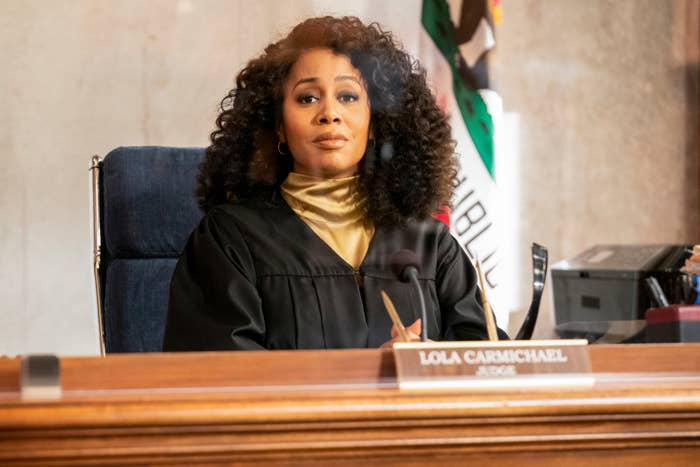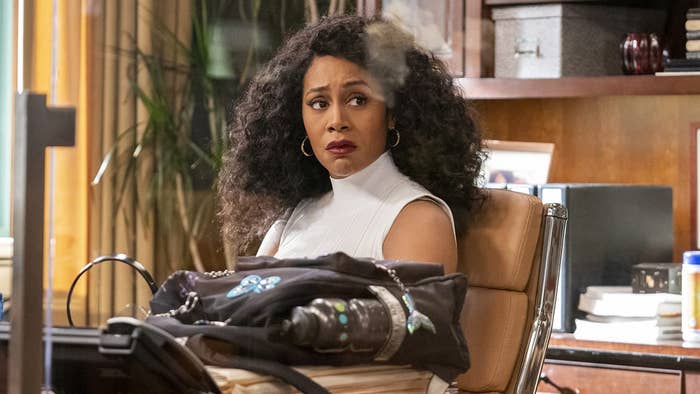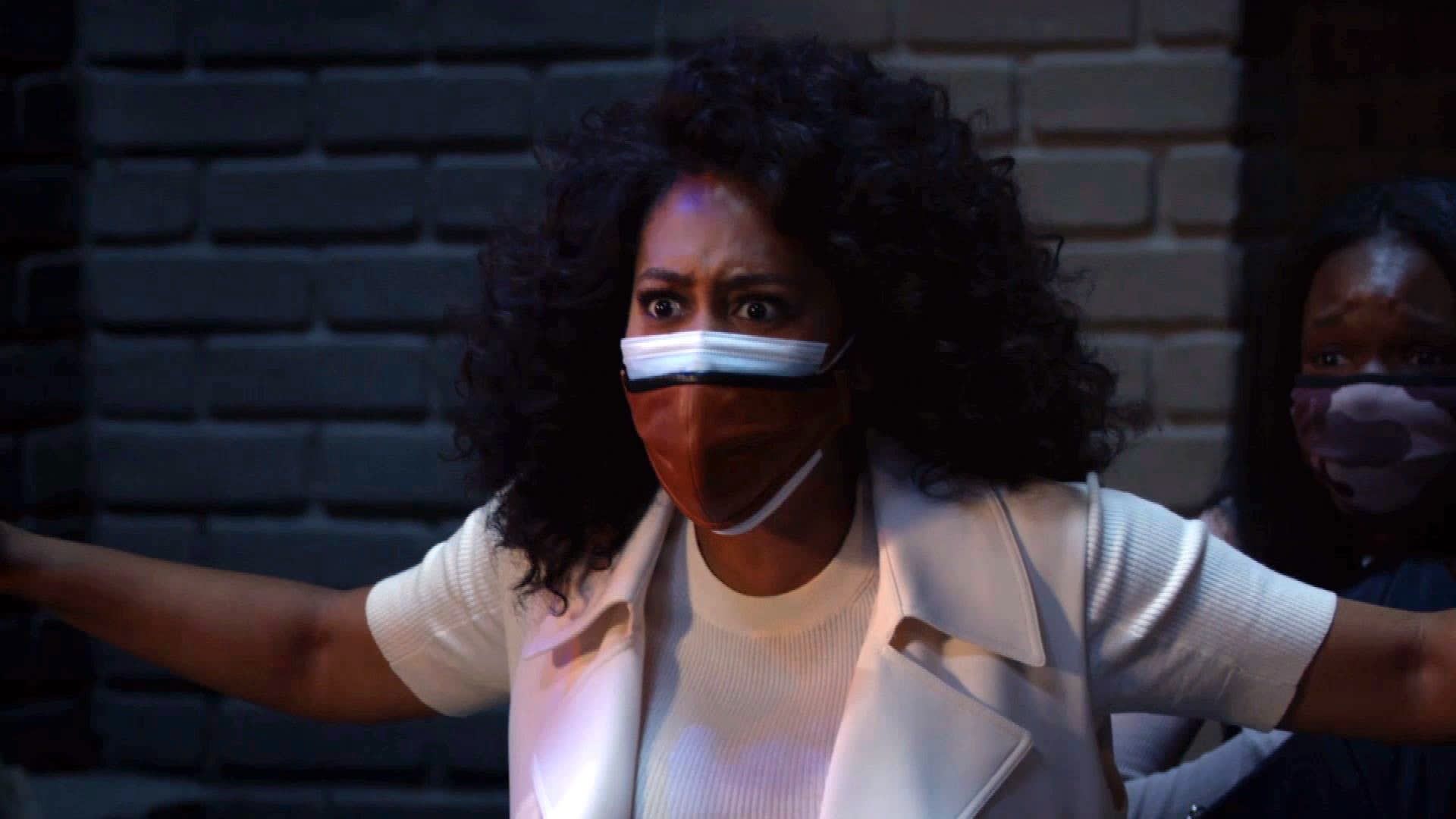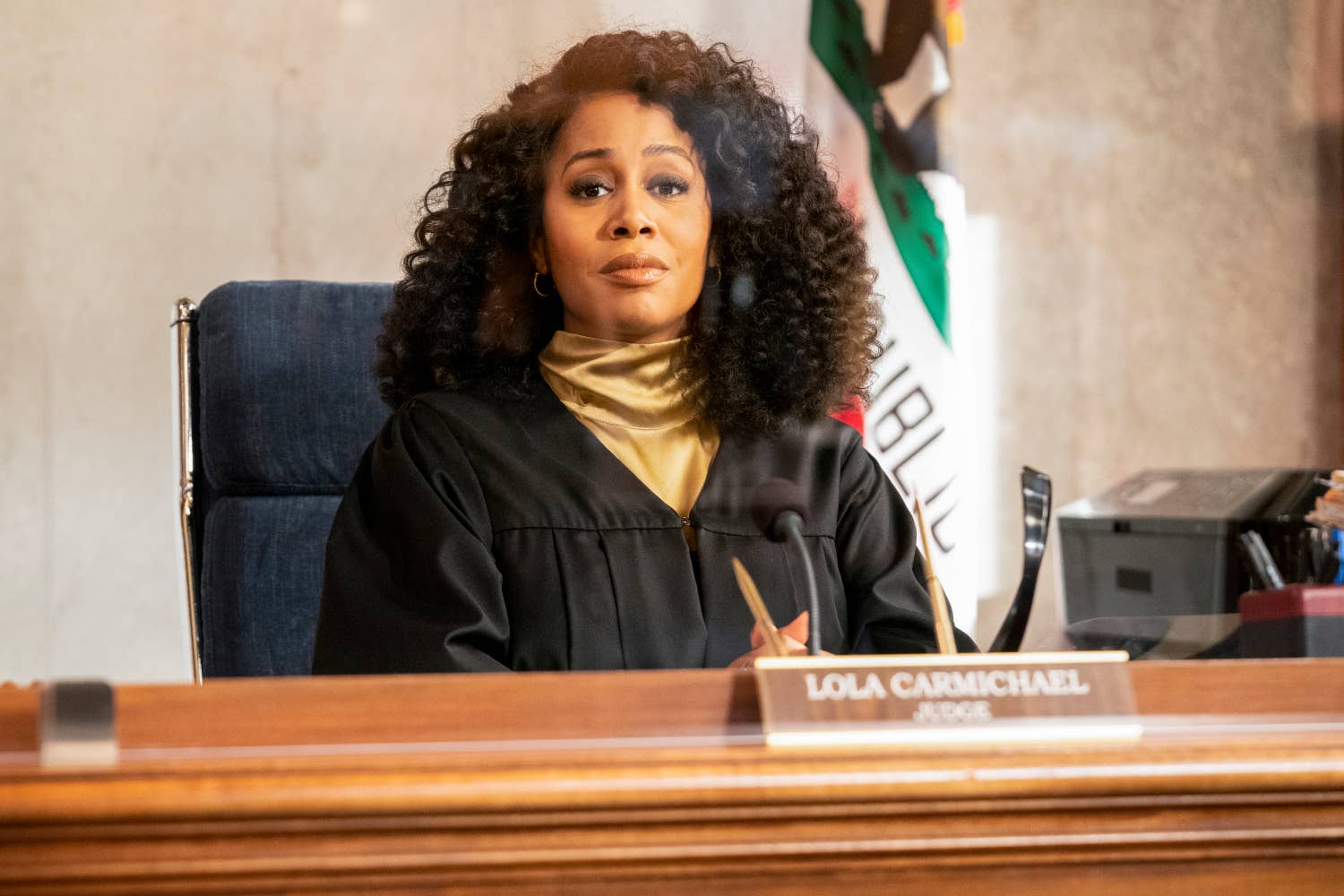
Simone Missick has been captivating audiences for years with varied and multi-dimensional characters that transcend a multitude of genres. With stellar performance after performance underneath her belt—including her work as Misty Knight on a number of Netflix's Marvel series—none has spoken to me quite like her portrayal of Lola Carmichael on the hit CBS series All Rise. As the series lead, Missick portrays a trailblazing judge who is an example for all people, but particularly Black women.
As much as I loved Season 1, the second season has brought race front and center in a meaningful way, bringing an additional layer of freshness, relatability, and transparency to the show that I didn’t know it needed until now. Complex caught up with Missick to discuss how COVID has changed the set, Lola and Mark’s strife, the creative freedom that comes with having another Black woman as showrunner, and what motherhood will mean for Lola’s career.

You guys pivoted due to COVID pretty early on compared to most shows, particularly in how you adjusted to Zoom for the final episode of Season 1. What was it like being one of the first shows to manage filming within this pandemic?
It's always so great to innovate, to be at the forefront of something. At the time when we shot the COVID episode last season, which was only a couple of months ago, we as a society, globally, were just dealing with a pandemic for the first time in a very long time and that was something that was affecting every person in the world, and it was important for us to highlight that. It was exciting in considering that this could be a way forward, which we did accomplish. Then we saw [that] so many late-night shows were able to film remotely and do it via Zoom, so to be the first drama series [to do that] was excellent, but it certainly changes the way that you act.
How has it changed your approach as an actress?
So, you're acting with a green dot and not necessarily the person that used to be standing right in front of you. Now that we're back, the way that we changed our filming has also allowed for us as actors to explore new skills. In the first season, at the finale shooting remotely, it's almost like motion capture. The dots are where you have to look, and you have to pretend and it's a lot of inner work. Now the way that we film, the crew isn't there. They come in, they set up about 15 different cameras...and then they leave. It's just the actors, so it feels like theater. We can just be in sync with each other, with the other actor, and not have to worry about if somebody's attention gets distracted. We do it for safety purposes, to make sure that there's the least amount of exposure as possible between crew and cast, but it has made it easier to film in certain ways.
Not only are you being pushed in new technical ways as an actor, but I feel like there’s growth and evolution I am seeing onscreen in Lola as well. I love every moment of it. While we always knew Lola was Black, it's different this season, the state of the world is different, the cultural climate is different. Elaborate on how race is a more prominent character this season.
In the first season, we saw Lola trying to establish herself as a judge. Not trying to establish herself as a Black judge or as a female judge, but just to prove to people who thought she was too young. Perhaps she wasn't as experienced or she was too liberal, but she was constantly proving that she deserved to be there [and] that she deserved to be there. There was the episode where she got brought in front of the judicial performance committee and she says, "Jeff Lee, the question isn't whether or not I can do my job, the question is whether or not you have a problem with me doing my job." That was a way of calling to question the people who were brought her before this board. They're all biased, but I think that the world being what it is now, having gone through the protests over the summer, [and] having watched the world take note of what is happening to Black men and Black women every single day in this country, it's impossible to ignore it. So I think this season, people have very head-on conversations about Black Lives Matter. About the role that a Black woman plays within the judicial system. The struggle that exists being a person of color and still having to maintain impartiality and that being questioned in a way that is never questioned of your white counterparts.

Has having a Black woman as co-showrunner opened the door for more creative freedom for you in expressing the fullness of Lola and her Blackness?
For sure. In the first episode, Lola gets arrested and people want to know, "could she'd be impartial towards a white man who acted out in violence against people at that same protest?" That would never be asked of any white male judge or any white female judge based on their case, whether or not they could be impartial. So there are always these double standards, but I think [in] this season, we get to explore [that] in an honest, unshielded way. Part of that, as you said, does have to do with having Dee Harris-Lawrence on our team, She came on board at the end of last season and she wrote the first episode. Having a Black woman write words for another Black woman, there is innateness in that, there is a knowing in that. You see it in the way that the writing came together, and you see it in the way that the audience has responded. So many fans have been on social media saying, "This is exactly how I feel. This is how I feel at work. This is how I feel at home. This is how I feel in my community. Thank you for putting my feelings on the screen in a way that I have not seen done on this show, on a CBS show before, perhaps on a network in the same way." It comes from knowing. Just like there are things that people within any particular group would know, it's the specificity that makes it so universal to people.
Something else the writers are leaning into is Mark and Lola’s relationship. They are obviously different and while Mark can be empathetic towards her, he will never be able to fully understand what it is like to be a Black woman in the world. So, while some issues were resolved, will we see some additional challenges rise again as we continue throughout season two?
Yes, we will. It was very important for me and our writers to explore how this past year has changed people. I have friends who are in interracial marriages, who have had to have conversations with their spouses that they never had to have. They've had to separate themselves from family members that at one point they were able to tolerate. But all of this coming to a head has made the conversations necessary, uncomfortable, and shift how people now operate. There's no truer way to show that than [with] these two friends, who have known each other for 15-plus years. And yet, as you said, Mark [Wilson Bethel] can never understand what it's like to be a Black woman. He could never even have to think about it in the same way that Lola's husband understands. He still doesn't have to experience it in the same way that she does. You can't go through something like this and not have that shift and have that influence their relationship and it will continue to mind how that comes to a head.
I think oftentimes we, as Black women, don't have that opportunity to fall apart especially onscreen. We see this a lot with Lola this season, which I appreciate. We even see it a bit when Lola finds out she’s pregnant. How will Lola becoming a mom during such a pivotal career time, create some additional rewards and challenges for her this season?
It's exciting to not only see Lola go through being a new mom or preparing to be a new mom amid COVID. What does that look like? That was important to me to speak to the millions of women throughout the world who are dealing with that. Who can't have their spouses at a doctor’s appointment or who have to balance what is the safety of myself and my child. We see women dealing with that every day. Also, what does that look like in her career? The moment where Lola finds out that she's pregnant, she throws her phone because this was not the trajectory that her career was supposed to be going on. She's just getting settled into being a judge! For me, my backstory, Lola didn't think that she could get pregnant. She struggled with that and had resigned herself that just wasn't a reality for her. So this happening at this time is not only scary and terrifying because you are raising a little Black baby in a country that you are so well aware of its imbalances and injustices and the racism that that child would face, but also at a time where, health-wise, the country and the world is in such an upheaval.
What I think we explored in the first season was Lola and her mother, which was the idea of being a mother and also fighting for justice and having a separate career and identity that wasn't just tied to being a mom. That created so much conflict with Roxy [L. Scott Caldwell] and Lola because Lola felt Roxy was never there. Now she has to then step in and try to be the parent that she always wanted. Will she be able to actually accomplish that and still succeed and do her job? What does that then make her experience as a mother, having someone's child in front of her? In that first episode, Lola jumps in front of the gun, because she has just found out she's pregnant. This is someone else's child that she is now protecting, much in the way that she could do the same for her own. So this season, we will get to explore, what does that balance look like? How does that affect her friendships, her relationship, her marriage, and her career? It's really exciting.


